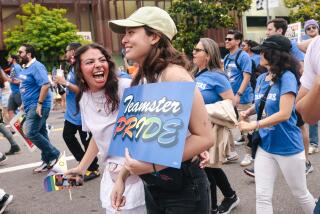A Permanent MTA Solution
- Share via
When the first few buses started rolling Monday after a 35-day strike, a beaming Los Angeles City Councilman Antonio Villaraigosa was the man of the hour. Or rather, of 25 hours. In marathon negotiations, Villaraigosa convinced Metropolitan Transportation Authority board Chairman Zev Yaroslavsky and bus mechanics union President Neil Silver to stop trading insults. Villaraigosa said that at one point during the discussions, he thought the two “were going to start exchanging recipes for matzo ball soup.” Just before midnight Sunday, the antagonists agreed to send their differences to an arbitrator instead of continuing to take them out on county residents who depend on public transportation to get to jobs, schools and doctors’ appointments.
Now the trick is to extend the arbitration deal to head off future strikes.
Under the agreement announced Monday, a panel of arbitrators will draft terms on the conflict’s remaining sticking point, health-care benefits. It will not be binding; either the MTA board or the union could reject the deal by a vote of two-thirds of their members. But the pressure to settle -- and the fact that the deal keeps both sides talking -- increases the odds that they will either reach a settlement first or accept the panel’s proposal.
This strike, largely over health benefits and wages, started Oct. 14. By late October, Yaroslavsky, MTA Chief Executive Roger Snoble and their labor relations team declared an impasse and issued a “last, best and final” contract offer; it was overwhelmingly voted down by the mechanics union.
Silver called for binding arbitration. The MTA refused. What a lost opportunity.
Yaroslavsky and Snoble defended their hard line by saying they wanted to break a union “culture” that led to two MTA strikes in three years. They were winning the public relations war, but their rhetoric and inflexibility only angered the strikers and created bitter feelings.
The turning point came Nov. 7. Villaraigosa and City Councilman Martin Ludlow, both MTA board members, had challenged the county counsel’s interpretation of a state law barring them, and Mayor James K. Hahn, from negotiations because they received union campaign contributions. A court ruling allowed them back in. At their urging, the two sides met face-to-face for the first time since late October.
The best lasting benefit to come out of this impasse would be a commitment by the MTA and the mechanics and bus drivers unions to arbitrate rather than strike. All sides applauded Villaraigosa on Monday. He should grab that momentum and use it to get both parties onto the sane middle ground of permanent arbitration.
More to Read
Sign up for Essential California
The most important California stories and recommendations in your inbox every morning.
You may occasionally receive promotional content from the Los Angeles Times.













